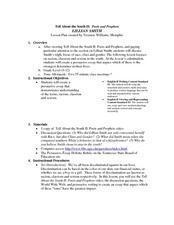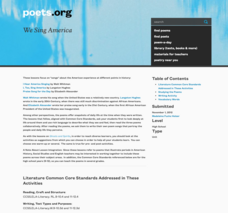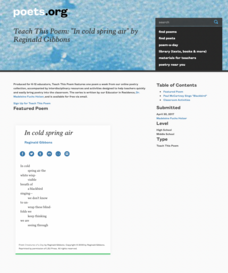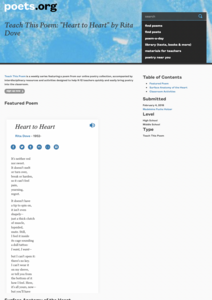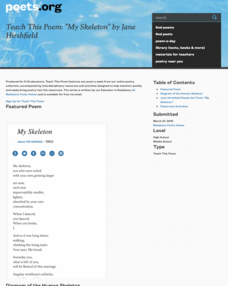Curated OER
Discovering Walt Whitman’s Timeless Poetry
Explore the work of the great American poet Walt Whitman in your classroom.
Curated OER
Lincoln is in the House! ("Name-Dropping" Poems and the Power of Connotation)
“What’s in a name?” Just about everything. Barack Obama, Vincent van Gogh, Justin Bieber. Famous names evoke a multitude of reactions and poets often use the names of famous people in their works precisely because names carry...
Teacher's Corner
Limerick
Young poets try their hand at one of the most popular fixed poetry forms, the limerick. The eighth in a series of ten poetry writing exercises.
Bolton Healthy Schools
Deal with Poetry
The stated goal of this unit is to use poetry to "improve the emotional health of young people." Budding poets read and then supply their own lines for poems that deal with alienation, loneliness, and rejection.
Harper Collins
Every Thing On It Lessons and Activities
Honor the great poet, Shel Silverstein with eighteen activities and lessons showcasing his collection of poems from the book, Every Thing On It. Activities challenge scholars to rhyme words, make inferences, recite a poem, and more!
Prestwick House
"Because I could not stop for Death" -- Visualizing Meaning and Tone
Emily Dickinson's "Because I could not stop for Death" provides high schoolers with an opportunity to practice their critical thinking skills. They examine the images, diction, rhythm, and rhyme scheme the poet uses and consider how...
Poetry4kids
How to Write a Free Verse Poem
Budding poets compose an original free verse poem. Encouraged to use personification and alliteration, scholars read over three tips and examples then try their hand at drafting a poem of their own style.
Poetry4kids
How to Write a Clerihew
Writing funny poems is the best part about learning poetic forms! Young poets learn all about clerihews—humorous four-line poems about people—with an explanatory lesson.
Curated OER
The Unraveling of a Poem
High schoolers study poetry and poets from different countries and time periods. They analyze various poems, present a dramatic reading of a poem and teach a poem they like to their class.
Curated OER
Working with Shakespeare, the Poet and Dramatist
Students study the work of William Shakespeare. They survey the elements of comedy and tragedy and read plays and poems. They discuss the texts they read and recite poetry. They dramatize poems with movement and sounds and write poetry...
Curated OER
I'm A Poet and Now I Know It
Eighth graders gather ideas generated from other poems and their own inspiration, to create original poetry. A celebration is included as students bind and submit poems for publication.
Curated OER
How Poets Evoke Social and Historical Representations
High schoolers explore how poems represent the social, historical, and cultural times that they were written in. For this poetry lesson plan, students compare and contrast poems with music of the time and explore implications of writing...
Curated OER
Tell About the South II: Poets and Prophets: Lillian Smith
Students watch Tell About the South II: Poets and Prophets video, discuss Lillian Smith's work and her triple focus of race, class and gender, and create persuasive essays that argue whether racism, classism, or sexism is strongest...
Curated OER
The Art of Poetry: The Lunatic, The Lover, and the Poet
Students, in groups, reflect on their attitudes towards poets and poetry. They read excerpts from George Puttenham's The Arte of English Poesie, which was written during Shakespeare's day. They compare their attitudes toward poetry to...
K20 LEARN
You Think You Have Problems: Perspective in Multi-Genre Literature
Young scholars are asked to reflect on how personal experiences might influence points of view and perspectives. They read poems and biographies of the poets and then match the poem to the poet. To justify their matches, learners...
Curated OER
Poetry Project
Choosing a poet or a theme, eighth graders conduct research in the world of poetry. They conduct Internet research and select five poems that fit their poet or theme, and create a seven slide PowerPoint presentation on their selected...
Academy of American Poets
We Sing America
Pair the famous poems "I Hear America Singing," by Walt Whitman, and "I, Too, Sing America," by Langston Hughes, with a more recent poem by Elizabeth Alexander called "Praise Song for the Day" to demonstrate a theme and introduce your...
MENSA Education & Research Foundation
Death Be Not Proud
Not dreadful, but mighty, this worksheet for “Divine Sonnet X” (aka “Death Be Not Proud”) models for individuals how to recognize John Donne’s argument for why Death should not be proud and how to recognize the sonnet structure and rhyme...
Curated OER
Poetic Elements
Poetry is all about sound and rhythm. The sound of the words, the rhythm of the lines, and the emotional atmosphere created by these elements and the literary devices poets use, compress whole stories into a few stanzas. The specialized...
Academy of American Poets
Teach This Poem: "In cold spring air" by Reginald Gibbons
Reginald Gibbons' poem "In cold spring air" provides learners with a chance to develop their noticing skills. As a warm-up, class members watch Paul McCartney's video singing "Blackbird" and note words and phrases that stand out. They...
Academy of American Poets
Teach This Poem: "Heart to Heart" by Rita Dove
Take heart! Here's a lesson plan that will encourage learners to notice details. After listening to Sarah Vaughan singing "My Funny Valentine" and noting how the word heart relates to Valentine's Day, scholars observe a human heart...
Academy of American Poets
Teach This Poem: "My Skeleton" by Jane Hirshfield
Jane Hirshfield's poem "My Skeleton" asks readers to pause and think about the amazing, often taken-for-granted structure that protects and gives form to human bodies. After observing the human skeleton's image, class members read the...
Academy of American Poets
Teach This Poem: "The Shapes of Leaves" by Arthur Sze
Arthur Sze's poem, "The Shapes of Leaves," encourages young scholars to notice and speak for others who "do not speak." The lesson begins with pupils writing about a tree that they really like. The class then examines an image of...
Academy of American Poets
Teach This Poem: "Wonder and Joy" by Robinson Jeffers
A study of Robinson Jeffers' poem "Wonder and Joy" reminds readers to notice and rekindle the appreciation of the many wondrous aspects of life. After a close reading of the poem, scholars use the provided questions to discuss the poem.
Other popular searches
- Famous Poets
- Harlem Renaissance Poets
- Dead Poet's Society
- Beat Poets
- Fireside Poets
- Dead Poets Society
- Famous Poets Shape Poems
- Afro American Poets
- African American Poets
- Romantic Poets
- Classic Poets
- American Poets














